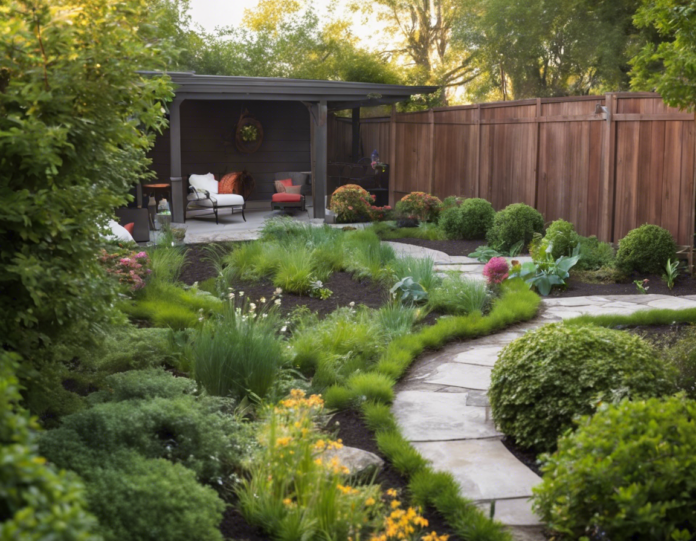Creating a secure and aesthetically pleasing backyard space can be easily achieved with the installation of a backyard fence. Fences serve multiple purposes, from enhancing privacy to providing safety for children and pets, while also adding a touch of style to your outdoor space. In this comprehensive guide, we will delve into the various types of backyard fences available, materials to consider, installation tips, maintenance requirements, and more.
Types of Backyard Fences
When it comes to selecting a backyard fence, there are several types to choose from, each with its own unique benefits and aesthetic appeal. Some common types of backyard fences include:
1. Wooden Fences
- Traditional and versatile option.
- Can be customized in various styles and sizes.
- Requires regular maintenance to prevent rot and decay.
2. Vinyl Fences
- Low maintenance and durable.
- Resistant to rot, decay, and pests.
- Available in various styles and colors.
3. Aluminum Fences
- Elegant and low maintenance.
- Suitable for decorative purposes.
- Resistant to rust and corrosion.
4. Chain Link Fences
- Cost-effective and durable.
- Provides security and visibility.
- Not as aesthetically pleasing as other options.
5. Wrought Iron Fences
- Strong and durable.
- Adds a classic and elegant look.
- Requires maintenance to prevent rust.
Materials for Backyard Fences
Choosing the right material for your backyard fence is crucial in ensuring its longevity and functionality. Wood, vinyl, aluminum, chain link, and wrought iron are the most popular materials used for backyard fences. Consider factors such as durability, maintenance requirements, cost, and aesthetic appeal when selecting the material that best suits your needs.
- Wood: Provides a natural look but requires regular maintenance.
- Vinyl: Low maintenance and comes in various styles and colors.
- Aluminum: Elegant and durable, ideal for decorative purposes.
- Chain Link: Cost-effective and provides security and visibility.
- Wrought Iron: Classic and sturdy, but prone to rust if not maintained properly.
Installation Tips
Proper installation is key to the effectiveness and longevity of your backyard fence. Whether you choose to DIY or hire a professional, here are some tips to ensure a successful installation:
- Check local regulations: Obtain any necessary permits and ensure compliance with local building codes.
- Plan your layout: Determine the fence line, gate placement, and any obstacles that may affect installation.
- Prepare the ground: Clear the area of debris and ensure it is level for a straight and sturdy fence.
- Use quality materials: Invest in high-quality materials to ensure durability and longevity.
- Proper maintenance: Regularly inspect and maintain your fence to prevent damage and prolong its lifespan.
Maintenance Requirements
To keep your backyard fence looking great and functioning properly, regular maintenance is essential. Here are some general maintenance tips based on the type of material:
- Wood: Stain or paint every few years to prevent rot and decay.
- Vinyl: Wash with soap and water to remove dirt and grime.
- Aluminum: Inspect for any scratches or damage, and touch up with paint if needed.
- Chain Link: Check for rust and repair or replace any damaged sections.
- Wrought Iron: Remove rust with a wire brush and apply a rust inhibitor and paint.
Benefits of a Backyard Fence
Installing a backyard fence offers a plethora of benefits, including:
- Privacy: Create a secluded outdoor space for you and your family.
- Security: Keep children and pets safe by creating a boundary around your property.
- Aesthetic Appeal: Enhance the look of your backyard with a stylish fence that complements your home.
- Property Value: Increase the value of your home with an attractive and functional backyard fence.
- Noise Reduction: Block unwanted noise from the surroundings, providing a peaceful outdoor environment.
Frequently Asked Questions (FAQs)
1. How tall should my backyard fence be?
The height of your fence will depend on its purpose. For privacy, a 6 to 8-foot fence is recommended, while decorative fences are usually shorter.
2. Do I need a permit to install a backyard fence?
Depending on your location, you may need a permit for fence installations. Check with your local authorities to ensure compliance.
3. How long will a backyard fence last?
The lifespan of a fence varies depending on the material. With proper maintenance, wooden fences can last 15-20 years, while vinyl and aluminum fences can last 20-30 years.
4. Should I hire a professional for fence installation?
While DIY installation is possible, hiring a professional ensures proper installation and can save you time and effort in the long run.
5. Can I install a backyard fence on my property line?
It is crucial to know your property lines before installing a fence. Consult with a surveyor to determine the exact boundaries.
In conclusion, a well-chosen and properly installed backyard fence can transform your outdoor space, providing privacy, security, and aesthetic appeal. Consider the various types and materials available, adhere to installation and maintenance tips, and enjoy the benefits of having a beautiful and functional backyard fence.

